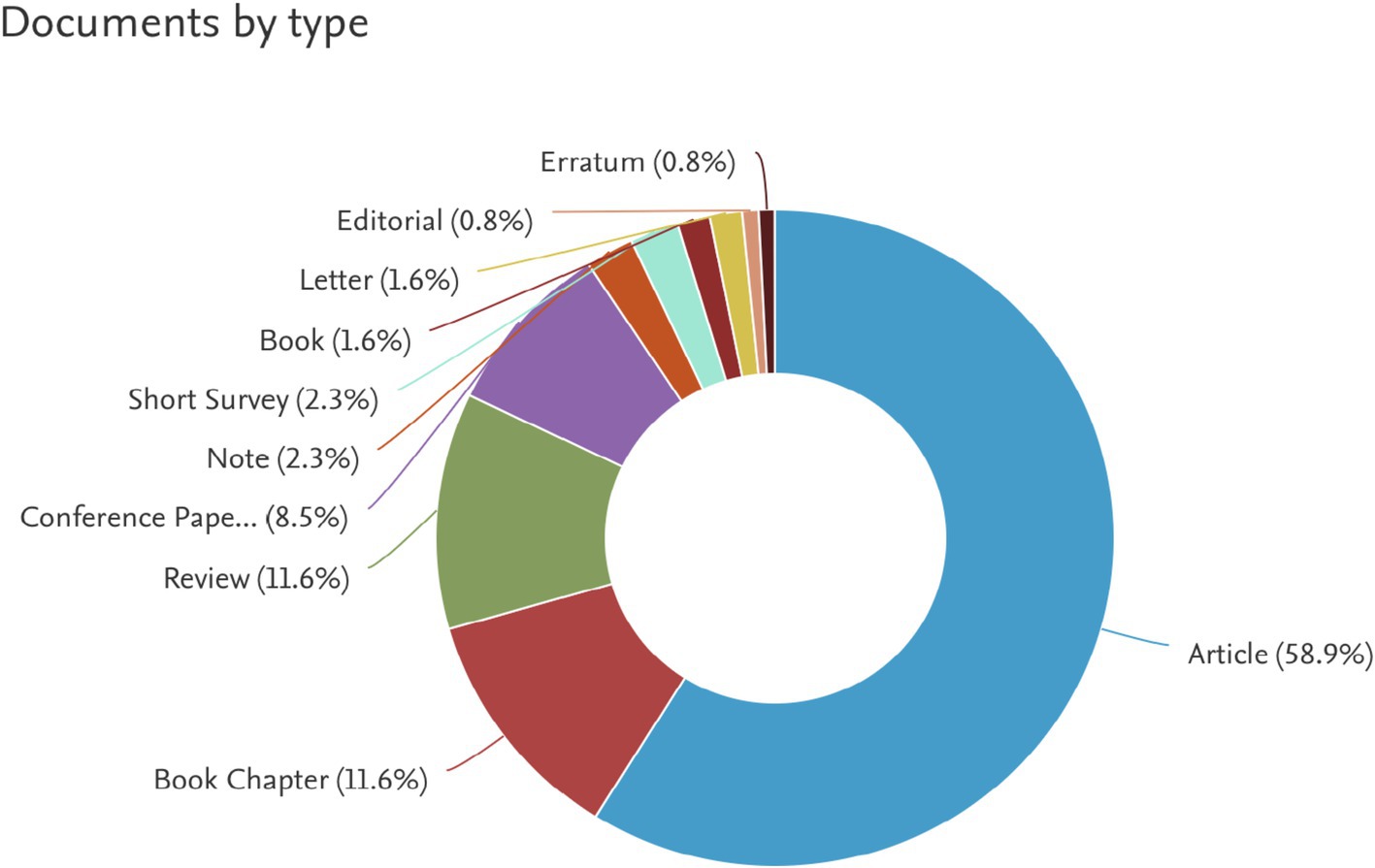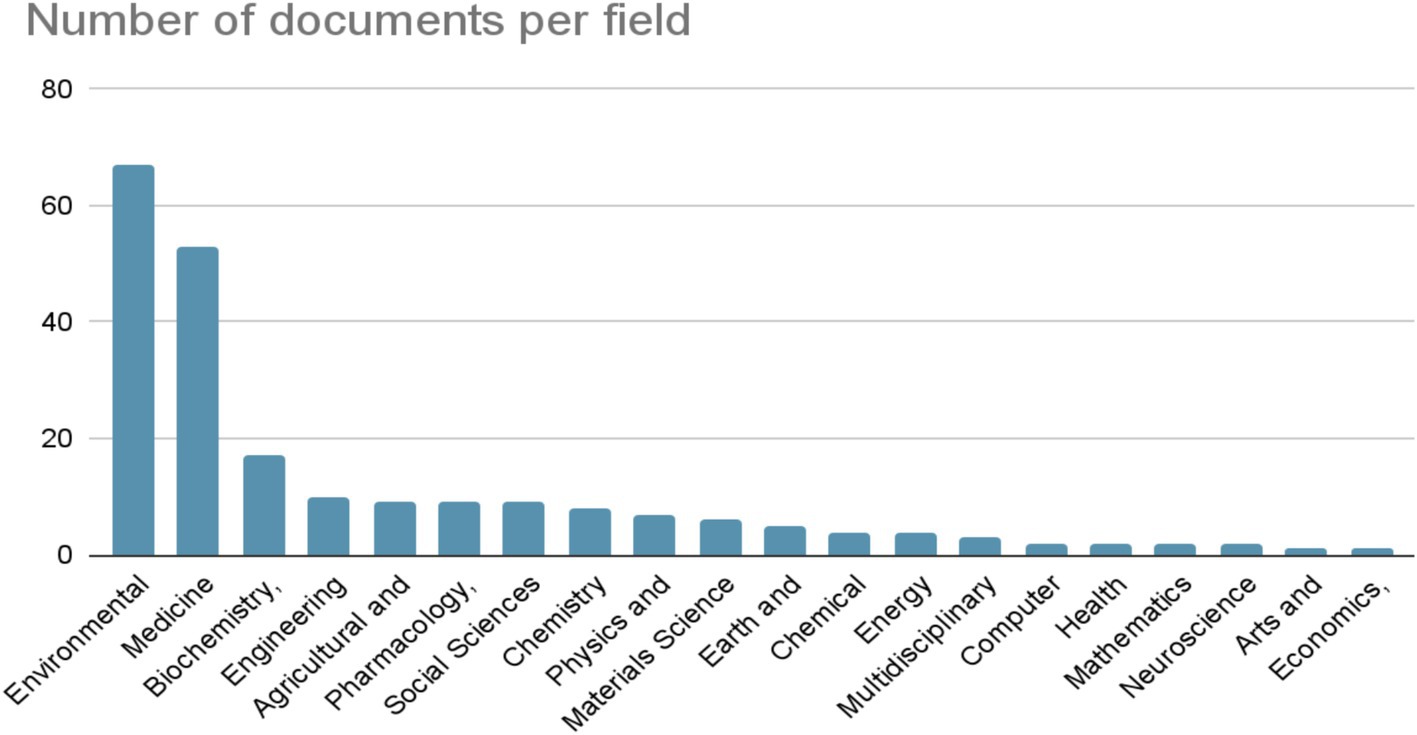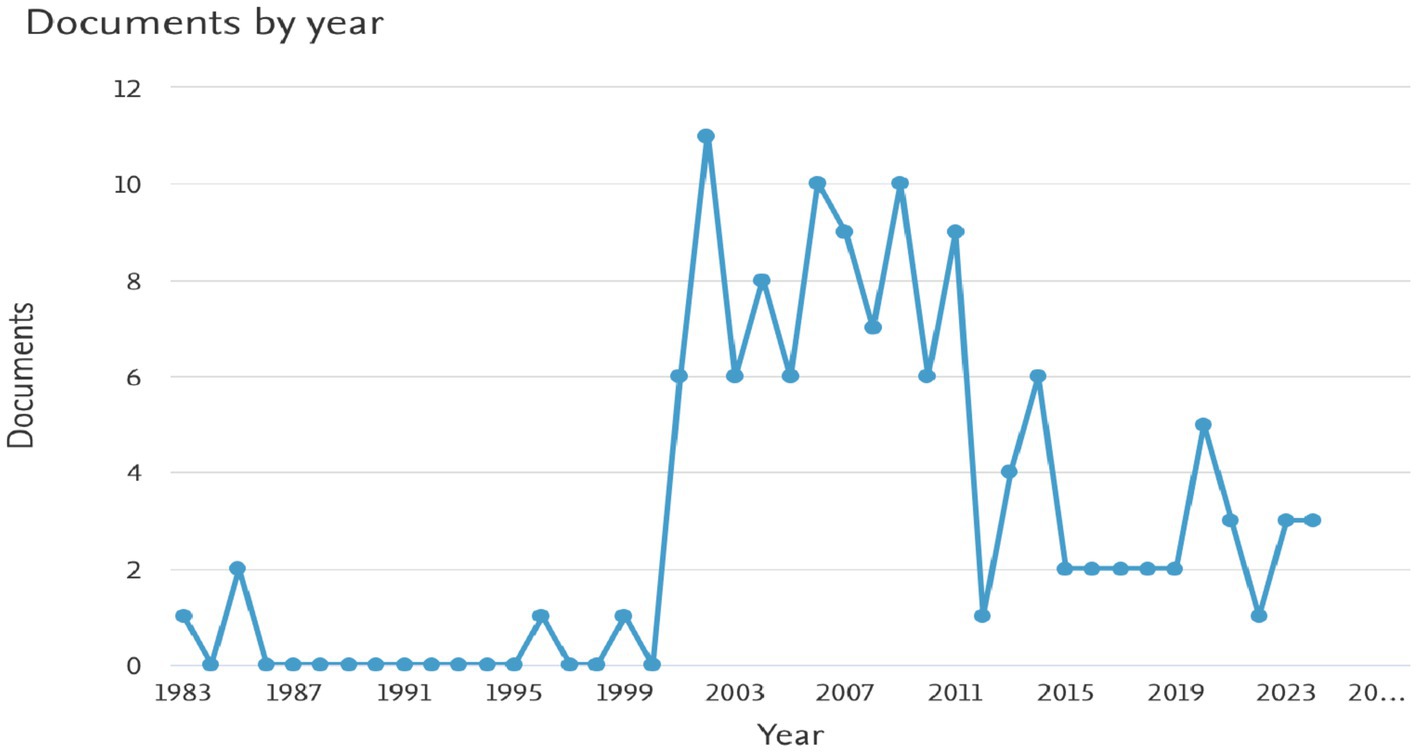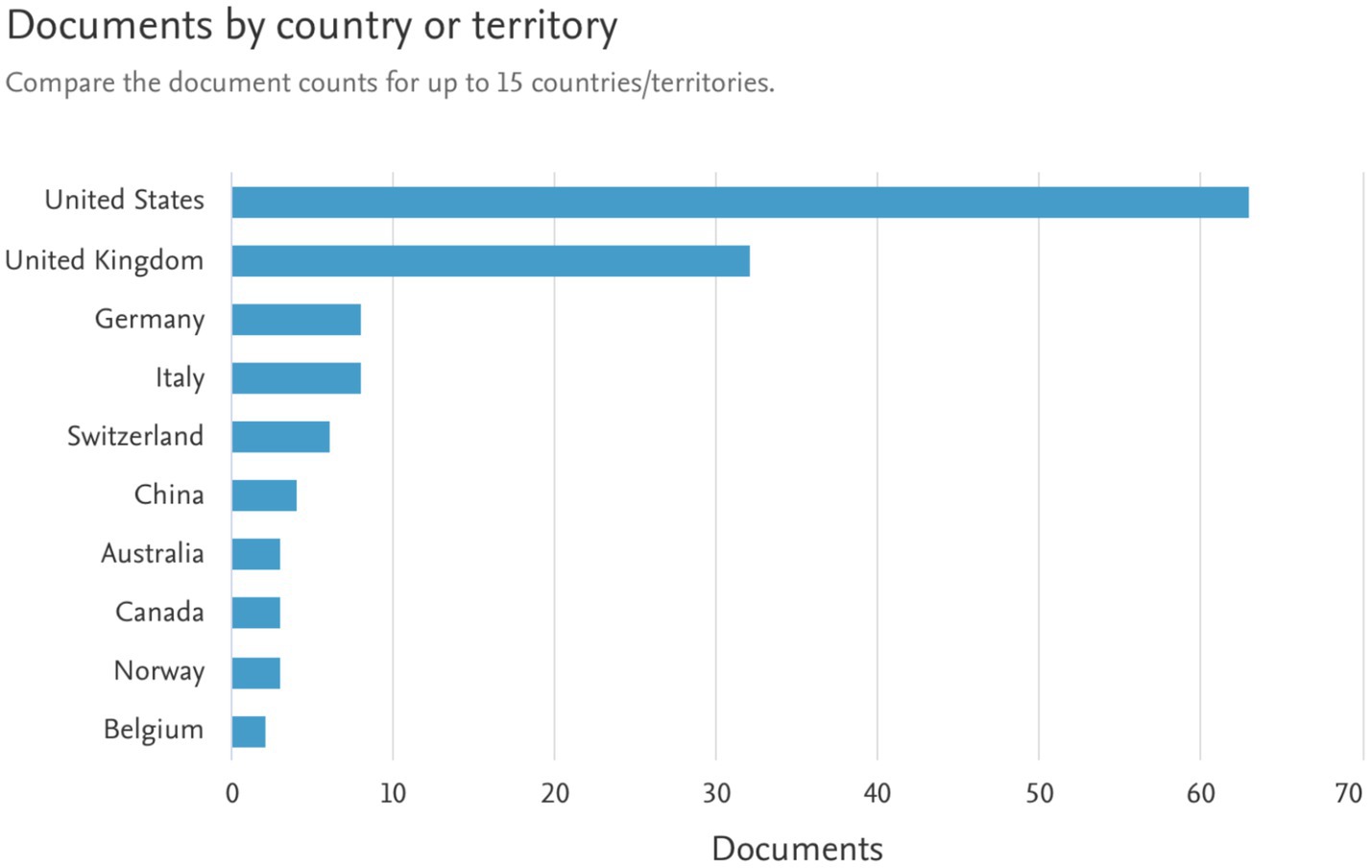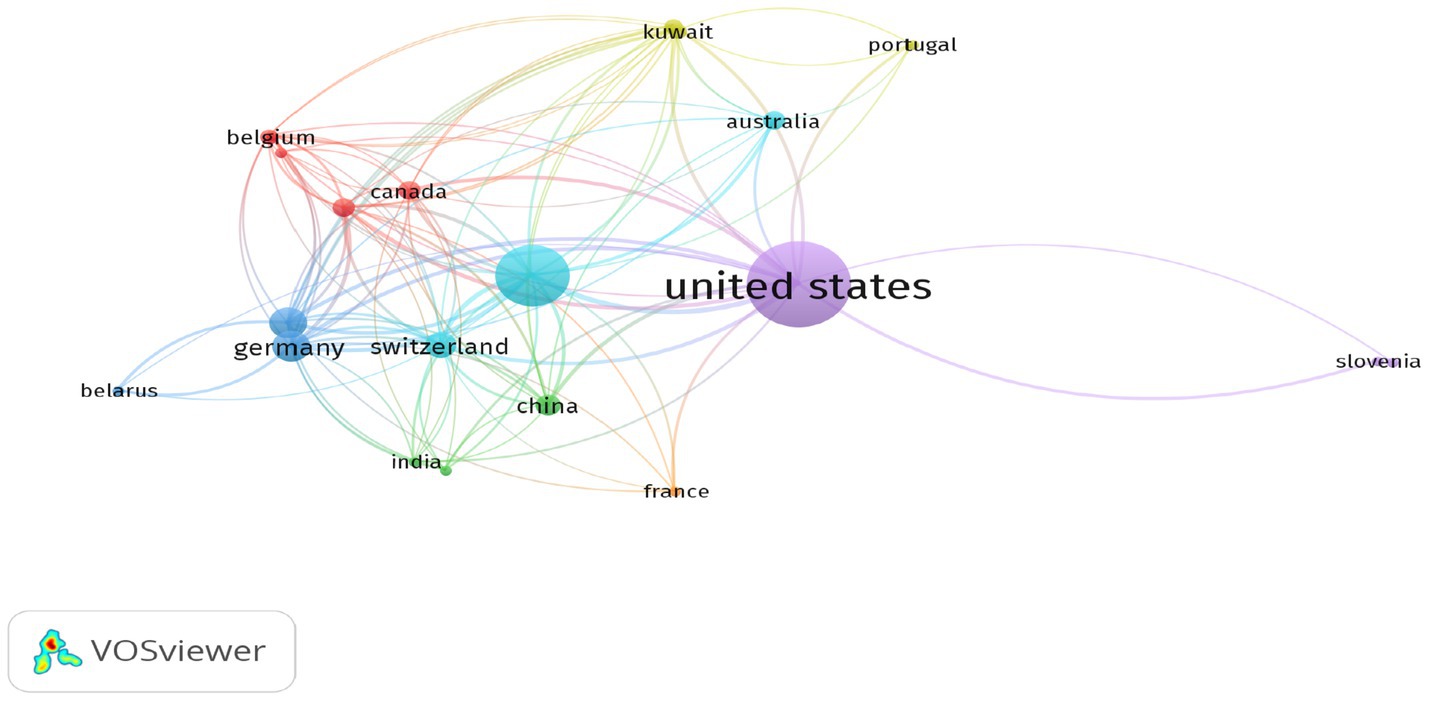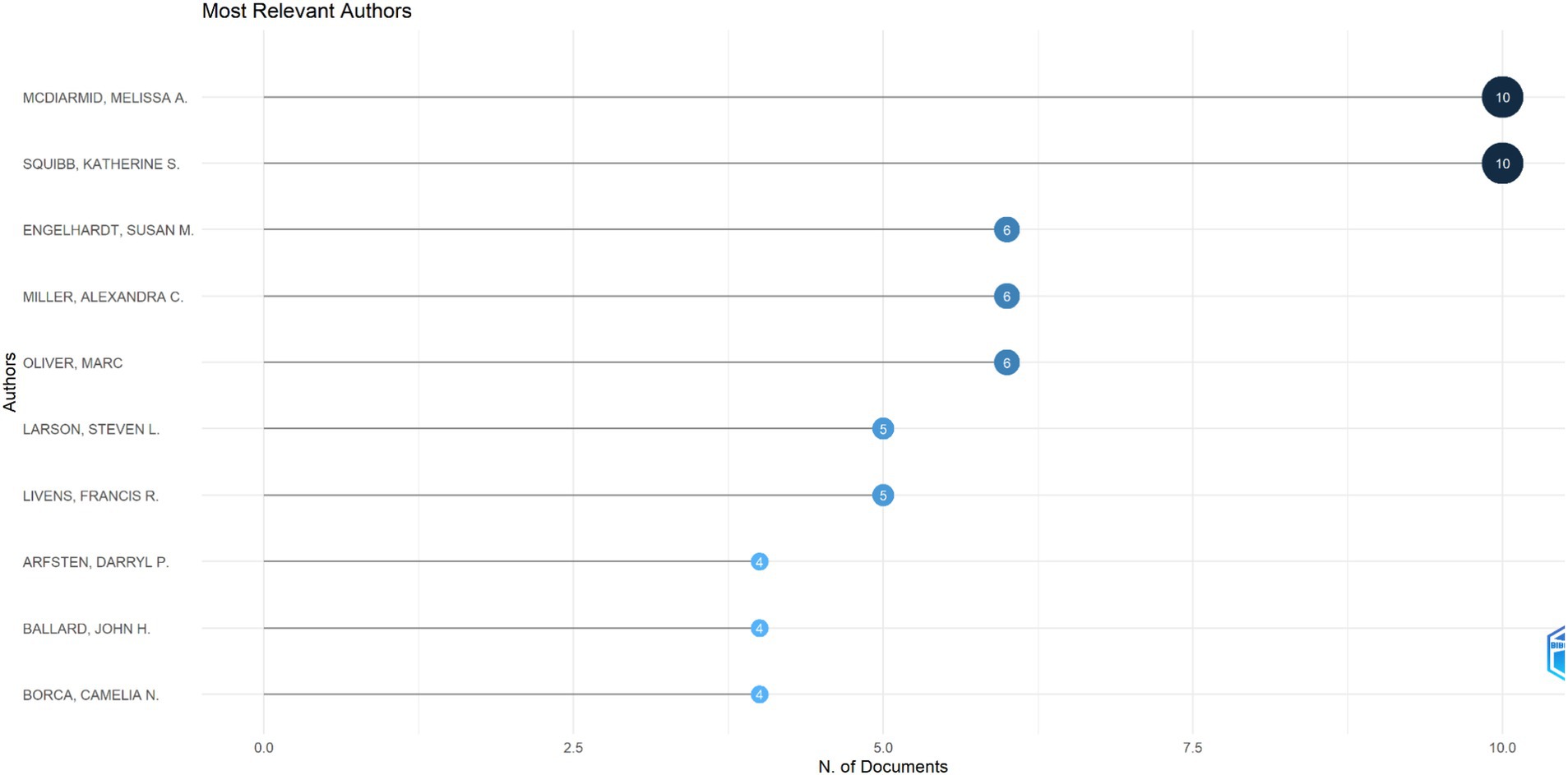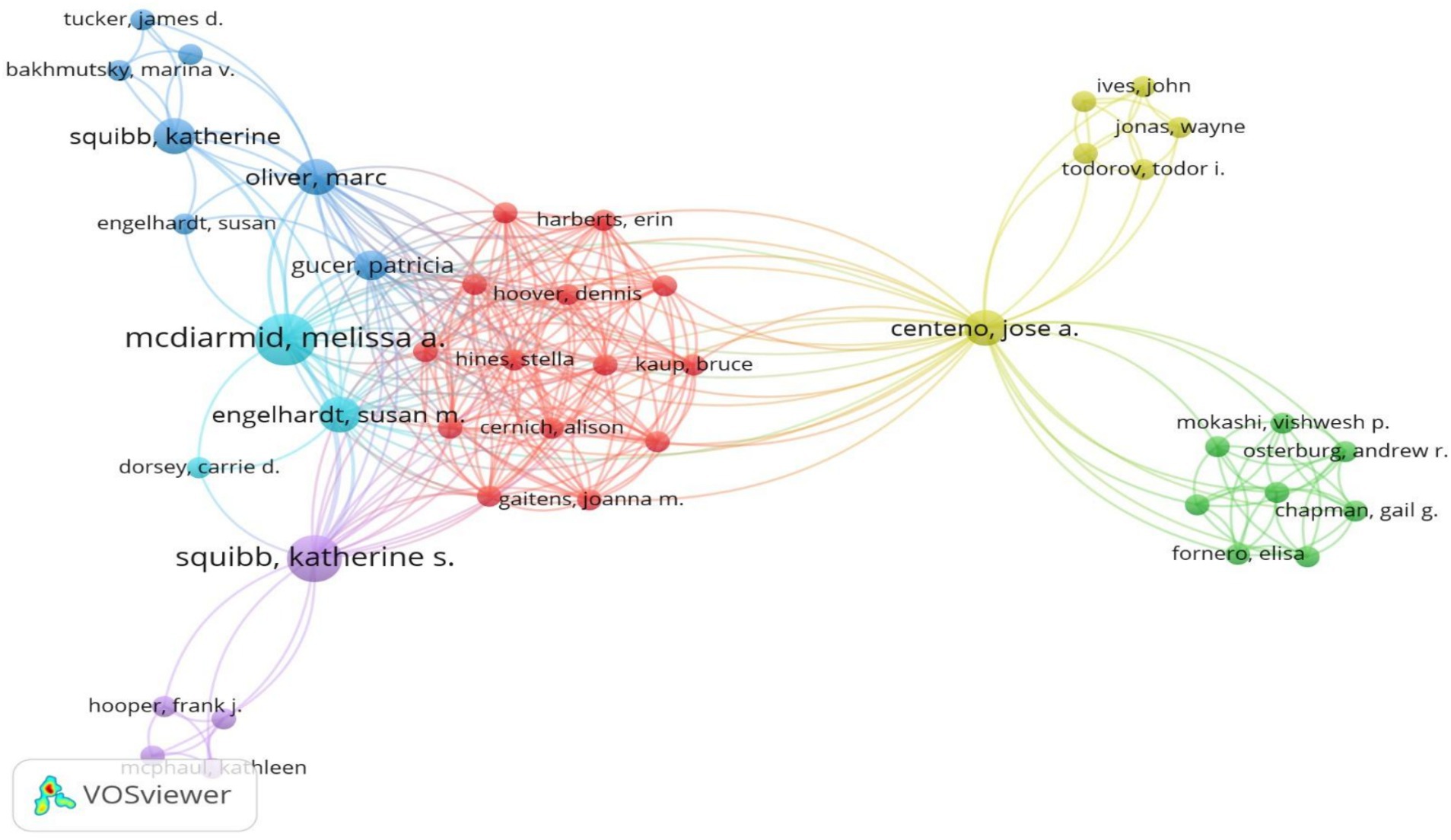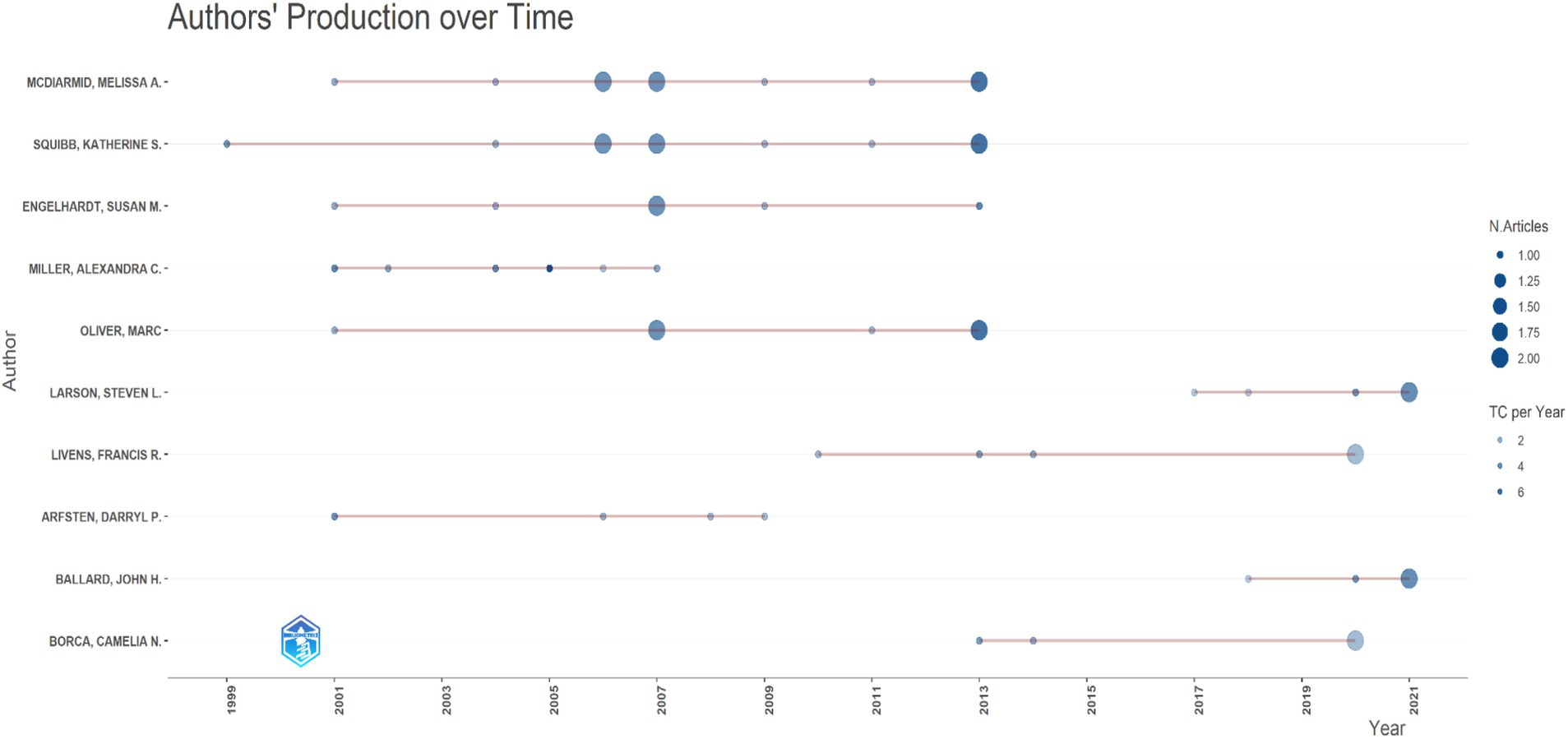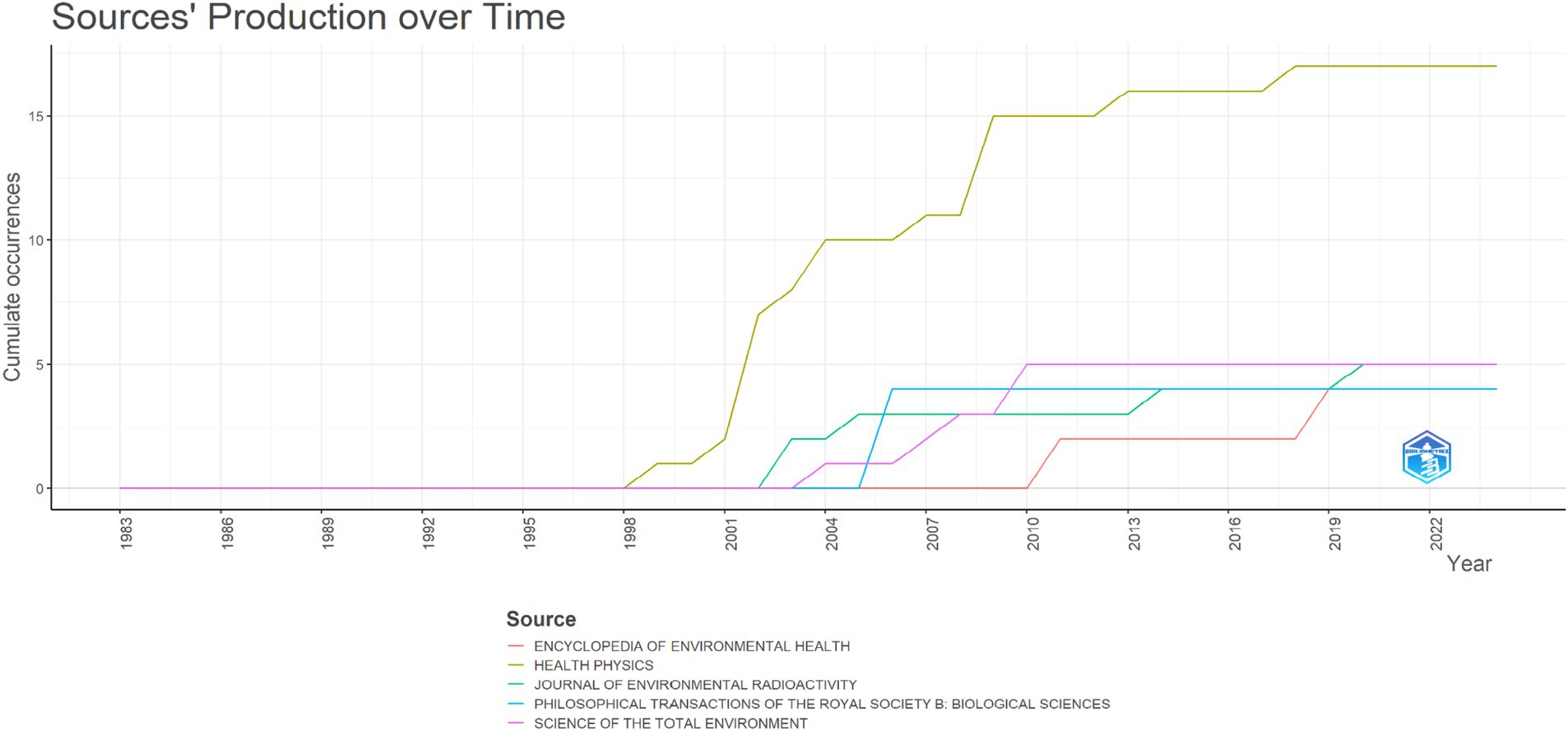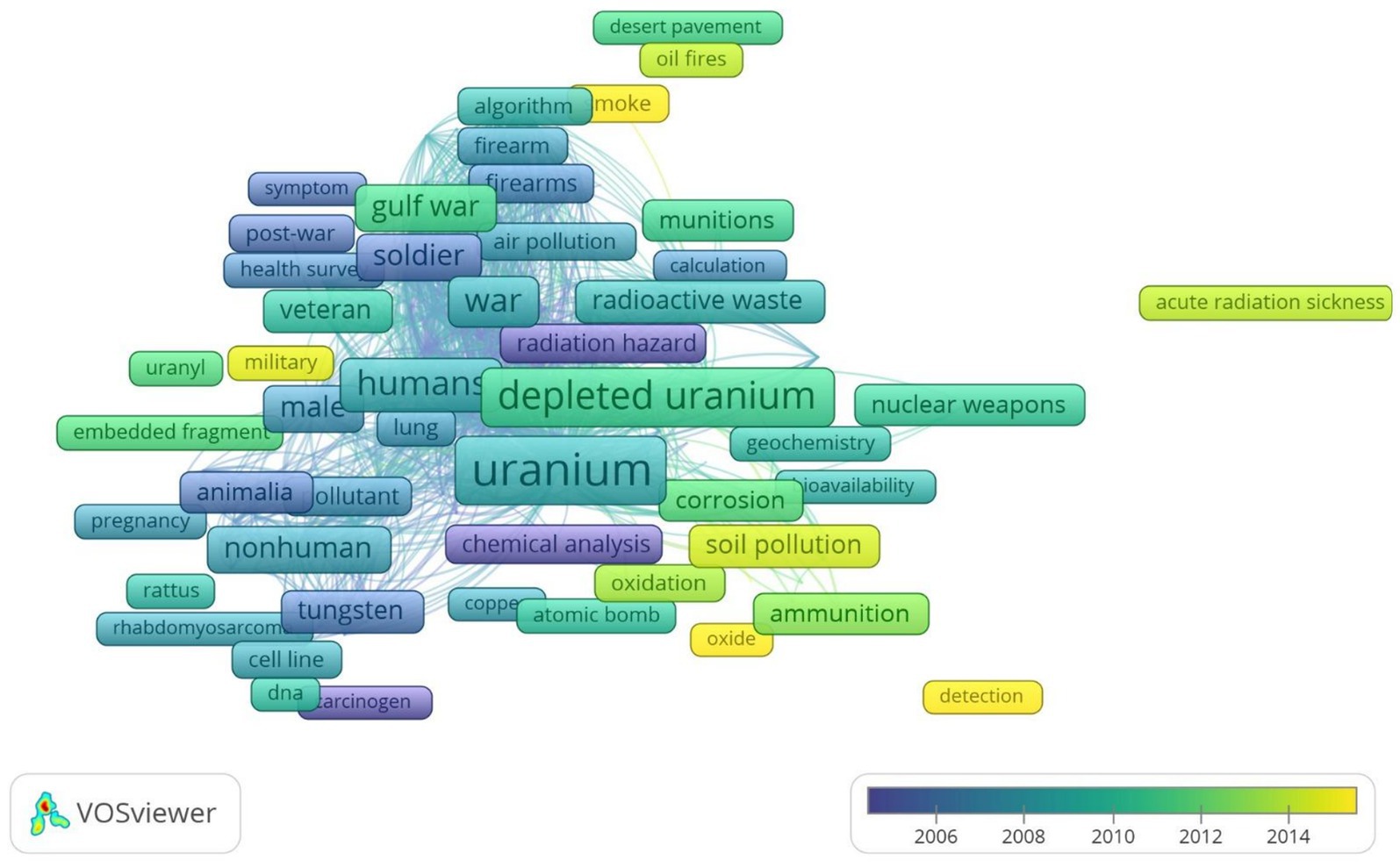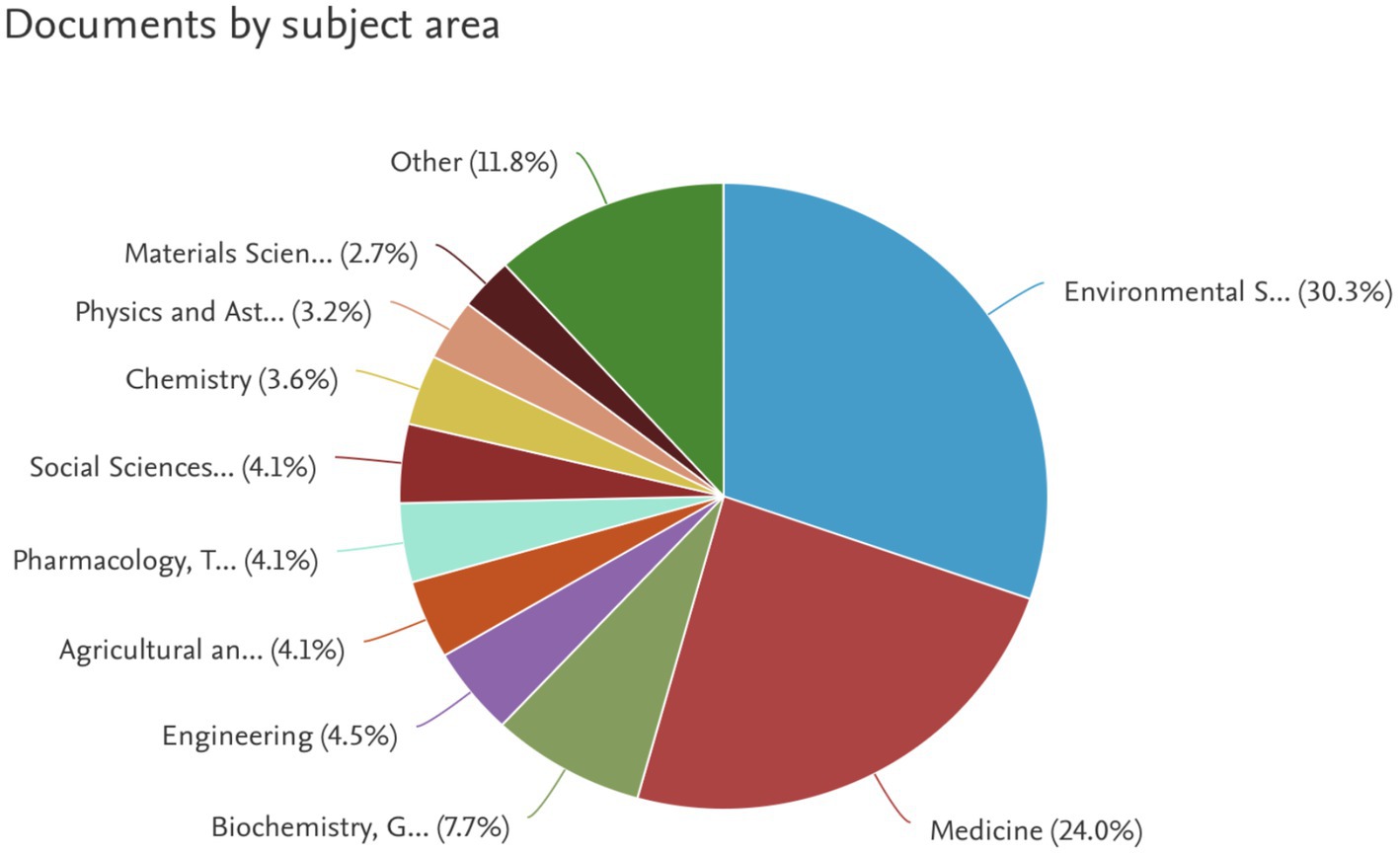- 1Department of Political Science, University of Minho, Braga, Portugal
- 2Department of Governnment and Law, Dublin City University, Dublin, Ireland
The study of depleted uranium (DU) munitions is crucial due to their potential health risks, long-term environmental impacts, and broader implications for international security. This multidisciplinary concern spanning from health and environmental sciences to international security has prompted growing scholarly attention, yet no comprehensive bibliometric analysis has been conducted to systematically map the evolution of this field. This study fills that gap by providing a structured, data-driven overview of DU research trends over the last four decades (1983–2024). Using bibliometric tools such as Biblioshiny and VOSviewer, we analyze 129 publications from Scopus to uncover key developments in this domain. Specifically, we examine the annual distribution of publications, document types, leading journals, country collaboration networks, and the most prolific authors. Additionally, we conduct a keyword co-occurrence analysis to identify dominant research themes, track their evolution over time, and assess conceptual density within the field. Our findings highlight the historical trajectory and current state of DU munitions research, and demonstrate the lack of research in the fields of Political Science, International Relations and in a broader term International Security. The main objective of this research is to analyze the scientific findings about DU weapons, enhance awareness about them and their hazards, and provide a framework for scholars and policymakers seeking to engage with DU-related research more effectively and pave the way for the prohibition of such toxic munitions.
1 Introduction
Following the deployment of the tanks protected by Depleted Uranium (DU) armor plates and suitable of employing DU armored piercing rounds in the Ukraine war, the potential risks and hazards of DU weapons has once again come to the center of attention, both in academia and beyond (Fuller, 2024). The study of the evolving health risks, environmental hazards, and the consequences of using DU munitions in combat is crucial for understanding regional (Eastern Europe) and international strategic dynamics, as it could shape future norms and values related to military conflicts (Eslami et al., 2024).
At first approximation, the analysis highlights several distinct literature streams, encompassing various aspects of DU munitions by health sciences, geographic and environmental sciences, engineering, and finally international relations, security and wars studies (Fetter and Hippel, 2000). These research include the potential health and environmental hazards, the level of toxicity (Katz, 2014) and radiation, challenges and advantages of production and use, as well as the political (Carpenter, 2011), legal and institutional dimensions for the deployment of such weapons on the battlefield. Although the literature on DU has been systematically analyzed across various fields, there is a notable absence of scholarly works that address the scarcity of DU munitions studies in Political Science and International Relations. Additionally, research that bridges the gap between the humanities and the natural and health sciences remains largely lacking (Inđić, 2021; Vuong et al., 2024).
Studies on DU weapons represents a diverse and evolving body of work that has expanded over time. There is a significant divide in the medical science field regarding the health hazards of DU munitions (Faa et al., 2018). Some studies and researchers argue that the use of DU weapons has led to several health issues, including cancer, birth defects, and respiratory problems in regions such as Iraq, Syria, and the Balkans (Storm et al., 2006). These findings have led to calls for the immediate cessation of the use of DU munitions (Eslami et al., 2024). On the other hand, there is a second group of researchers who claim that there is no clear mechanistic relationship between DU exposure and human health security. They argue that the risks posed by DU weapons are overblown and that more research is needed to definitively link DU exposure to specific health issues (Young, 2021).
DU has also been a topic of much debate within the field of environmental science. While some researchers argue that the use of DU weapons has resulted in severe environmental consequences (Briner, 2010) including increased water and soil pollution in regions such as Iraq, Syria, and the Balkans, others maintain that there is no significant negative impact on the environment from the use of DU (Al-Ansari et al., 2014). Those who advocate for the cessation of DU weapons point to the extensive time and resources required for the cleaning process of DU from the environment, making it a costly and lengthy endeavor (Besic et al., 2017).
The debate surrounding DU weapons has garnered attention in the fields of political science (Carpenter et al., 2014) and international relations due to conflicting opinions and findings regarding their effects on human health and the environment (White, 2008). Some argue for a ban on the use of DU munitions, citing concerns about their potential long-term consequences and catastrophic effects. Others advocate for the continuation of their production and use, pointing to their effectiveness in military operations and their strategic value (Mizokami, 2020). These trends highlight the complexity of the issue and the need for a nuanced understanding of the implications of using DU weapons (Shannak et al., 2025; Tarkhani, 2024) in armed conflicts (Sutton and Novkov, 2008).
From an exploratory perspective, the literature in health and environment has been more developed than in political science. This study aims at identifying the existing gaps in research on DU by comparing different scientific areas. To address this goal, we conduct a comprehensive bibliometric analysis of DU weapons to illustrate how this approach not only identifies key publication trends but also provides valuable insights into the evolution and multidimensional nature of DU research. Specifically, it aims to address the following questions:
1. What are the bibliometric characteristics of the research on Depleted Uranium Munitions?
2. What are the key research themes and how have these evolved over time?
Therefore, our objective is to firstly address the established research questions, secondly, create a visual representation of the knowledge structure within the literature, and finally, identify potential directions for future research. To do so, we draw on a bibliometric analysis of results including ‘Depleted Uranium Munitions’ or ‘Depleted Uranium Weapons’ in their title, keywords or abstract as extracted from the Scopus databases, relative to the period of 1983–2024. This timeframe was chosen to capture the evolution of the research on DU weapons and their potential hazards during and following the Balkan and Gulf wars (Papageorgiou and Vieira, 2021). The analysis also incorporates visualizations of the results (generated using VOSviewer and Biblioshiny) to identify the most frequent terms and themes used.
The article is organized as follows: We begin with a section on DU munitions, covering their production and the most recent efforts to ban such weapons. The second section details the methodology and data collection process, followed by an overview of the findings across different research areas during the selected time period. A more detailed analysis of the results from various scientific fields is then provided. Additionally, we present the outcomes of the content analysis of keywords, titles, and abstracts, including their density and growth over time. Finally, we conclude by summarizing the analysis results and suggesting potential directions for future research.
2 Depleted Uranium Munitions: production, use, and normative prohibition
DU was originally produced as a by-product of uranium enrichment during the Manhattan Project (Nelson and Carmichael, 1960; Gosling, 1999). Scientists involved in the project realized that DU could be utilized to develop weapons with improved armor-piercing abilities, eliminating the need for costly and difficult-to-obtain highly enriched uranium (Mizokami, 2021). The enrichment process separates fissile uranium-235 from the more abundant uranium-238. Depleted uranium, composed mostly of uranium-238, is left behind. Initially regarded as nuclear waste, DU began to attract military interest due to its high density and pyrophoric properties. The material was stockpiled in large quantities during the Cold War, and by the 1960s and 1970s, the military-industrial complex began investigating its potential applications (Belkin, 2024). Production facilities were adapted to fabricate DU alloys into penetrator rods, tank armor modules, and aircraft ballast. The availability of large DU reserves—held by nuclear energy and weapons programs—meant that military researchers could source the material in bulk without incurring major costs. This wide availability, combined with its metallurgical properties, accelerated the adoption of DU across numerous weapons platforms (Holton, 2024). In the 1970s, the Pentagon reported that Soviet forces had developed armor plating for the T-72 tanks of the Warsaw Pact, which NATO ammunition could not penetrate. In response, the Pentagon sought a material that could enhance the density of armor-piercing projectiles. After testing different metals, researchers settled on DU.
DU offers two primary military advantages. First, it is highly dense, and its initial use was as armor plating for military vehicles. This same property made it ideal for armor-piercing munitions. When a DU projectile strikes an armored target, it does not flatten on impact but rather penetrates and “self-sharpens” as it moves through the armor (Fetter and Hippel, 1999). This effect occurs because the projectile’s outer layer ignites upon contact, producing radioactive dust that lubricates the remaining projectile and aids its continued penetration. Second, DU is often provided to military industries at a very low cost (sometimes even for free) by stockpilers who seek to relieve themselves of storage responsibilities. This dual benefit helped revolutionize military technology.
DU has been used in a variety of armaments, including high-explosive anti-tank (HEAT) munitions, tank armor, anti-tank shells, and even certain types of missiles and aircraft counterweights. Modern battlefields are saturated with DU, as high-density DU alloys are among the most widely used nuclear-based materials in weapons, known for their proven effectiveness in armor penetration (Eslami et al., 2024).
DU has been deployed in anti-armor rockets, various types of cruise and ballistic missiles, hypersonic munitions, artillery shells, and even regular bullets. The US began using DU munitions in the 1990s (White, 2008), with armor-piercing shells and bullets fired from American tanks and planes during the 1991 Gulf War. DU munitions were also used by NATO forces in the Balkans in the 1990s (Young, 2021), including during Operation Deny Flight in Bosnia in 1994 and the 1999 NATO bombing campaign in Kosovo. In 2001, during the invasion of Afghanistan, the US and its allies used DU munitions, reportedly from aircraft targeting Taliban tanks and fortifications. The 2003 Iraq (Mizokami, 2021) invasion also saw extensive use of DU munitions, particularly in urban areas like Baghdad and Basra. Other countries, such as the UK and Israel, have also utilized DU in combat, with the UK employing it in the Gulf War and the Balkans, and Israel using it during its 2006 conflict with Hezbollah in Lebanon (Bruess et al., 2020; ICBUW, 2022). Additionally, the US Army deployed thousands of DU rounds during its 2015 attacks on ISIS militants in Syria.
International efforts to ban DU munitions have evolved over the years, with significant contributions from various nations and organizations. In 2001, Iraq raised concerns at the United Nations about the health risks linked to DU exposure, including cancer and birth defects, advocating for a global ban. Belgium followed suit in 2007, passing a parliamentary resolution that called for the prohibition of DU in military operations due to its harmful effects (Carpenter, 2016). Costa Rica and New Zealand also voiced support for international measures aimed at restricting DU use, citing not only humanitarian consequences but also environmental degradation in post-conflict zones (Lindsay-Poland, 2009). Several non-governmental organizations, including the International Coalition to Ban Uranium Weapons and Human Rights Watch, have actively campaigned for international legal frameworks that would categorize DU weapons under the same scrutiny as chemical and biological arms. At the UN, although no comprehensive treaty banning DU exists, several resolutions have been adopted, including a 2006 Human Rights Council resolution expressing concern over DU’s impact on civilians and the environment. In 2011, the UN General Assembly urged member states to share information about DU’s effects and consider the associated health risks. Despite repeated calls for prohibition, key military powers—including the United States, Russia, and the United Kingdom—have opposed legally binding restrictions, citing strategic deterrence and the lack of universally accepted scientific conclusions on DU’s long-term health effects (Compaan, 2011). This division within the international community continues to hinder the development of a normative legal instrument that could categorically prohibit DU munitions (Handley-Sidhu et al., 2010). Despite these efforts, achieving a binding international agreement remains challenging, as some countries continue to prioritize military necessity over public health concerns.
3 Method and data collection process
Bibliometrics is the study of research trends and citation patterns, involving the analysis of academic literature through quantitative methods. According to Aria and Cuccurullo (2017) bibliometric studies complement the literature review on a topic by organizing, structuring and quantifying the available bibliographic information. This method can be defined as ‘the measurement of all aspects related to the publication and reading of books and documents’. The analysis consists of five stages: study design, data collection, data analysis, data visualization, and interpretation.
Although bibliometric studies are rapidly expanding across various research fields like Environmental Studies, Engineering, Medical Sciences, Agriculture, and Political Science and International Relations, there is limited understanding of the dynamics of academic research on Depleted Uranium Munitions. However, there has been scattered research on the nature of DU munitions and the potential hazards in various fields of study (Fetter and Hippel, 1999).
Aiming to conduct a bibliographic analysis and literature review, the scientific literature on Depleted Uranium Munitions was studied. In line with this, a total of 129 publications between 1983 and 2024 were analyzed. This analysis was conducted in November 2024. The initial search string used in the literature withdrawal included: “Depleted Uranium” and “Munitions” or “Depleted Uranium” and “Weapons.” The search field was limited to “title,” “abstract,” and “keyword.” Afterward, the data collection was refined using inclusion and exclusion criteria based on the defined scope of the analysis to be conducted.
These papers were retrieved through the Scopus and Web of Science (WoS) scholarly databases. However, due to the complete overlap of WoS documents with those indexed in Scopus, we relied solely on Scopus data to avoid duplication1. Scopus (Butu et al., 2023) was selected for its extensive coverage of peer-reviewed literature across multiple academic disciplines, as well as its advanced search and filtering capabilities, which facilitate a comprehensive bibliometric analysis (Ghani et al., 2022). While some studies exclude book chapters and conference papers, we chose to include all retrieved documents due to the relatively low number (Papageorgiou and Vieira, 2021) of publications on DU munitions. To ensure a systematic and replicable selection process, we focused on publications from 1983 to 2024, covering four decades of research on DU munitions. Only peer-reviewed journal articles, conference papers, and review articles were considered, as these document types undergo rigorous scholarly evaluation. Exclusion criteria were also applied to ensure the quality and relevance of the dataset. According To this criteria, all those research that are not indexed in Scopus or WOS have been excluded. Studies that discuss DU metal in other relevant industries without substantial discussion on their military use were excluded to ensure that the dataset remained focused on meaningful contributions to the field. Given these selection parameters, this methodology provides a structured and reproducible approach to analyzing the bibliometric trends in DU munitions research.
The final database comprised author, institution, country, keyword, source, category, and citation data from 129 documents, which form the foundation for the study’s data processing and interpretation. Figure 1 demonstrates that among these 129 documents, 58.6% were peer-reviewed research articles, 11.6% were book chapters, 11.6% were review articles, 8.5% were conference papers, 2.3% were notes, 2.3% were surveys, and 1.6% were books. This distribution highlights that the majority of publications on DU munitions are scholarly research outputs, with journal articles forming the dominant category. It is important to have the majority of the analyzed documents from peer-reviewed articles, as these typically undergo a more rigorous assessment process and provide more reliable results. Reviewing other bibliometric analysis studies in the fields of political science and international relations also demonstrates that other research sets an informal standard of having more than 50% of the data from peer-reviewed articles and less than 15% from review articles and book chapters (Mehmetcik et al., 2024). The presence of review articles further suggests a sustained effort to synthesize existing knowledge, while conference papers and book chapters indicate ongoing discussions and contributions from diverse academic and professional communities.
In this study, Biblioshiny (part of the Bibliometrix R package) and VOSviewer were chosen as the primary tools for bibliometric analysis due to their complementary strengths. Biblioshiny provides a user-friendly interface for conducting comprehensive bibliometric analyses, including descriptive statistics, trend analyses, and network mapping, making it ideal for an in-depth examination of publication patterns. VOSviewer, on the other hand, is particularly effective for visualizing co-occurrence networks, clustering bibliometric data, and handling large datasets, allowing for a more nuanced exploration of relationships between authors, keywords, and cited references. While other tools such as CiteSpace, SciMAT, and Gephi exist, they either require more complex coding skills, lack certain visualization capabilities, or do not integrate as seamlessly for the types of analyses conducted in this study. In addition to tool selection, rigorous statistical methods were applied to validate the results, including descriptive statistics (e.g., publication trends and citation distributions), co-occurrence analysis (to identify thematic structures through keyword clustering), and network analysis (examining co-citation and bibliographic coupling patterns). Furthermore, classical bibliometric laws such as Bradford’s Law, Lotka’s Law, and Zipf’s Law were considered to assess the distribution of literature, author productivity, and keyword frequency. These methods ensure the reliability and robustness of the findings, providing a solid foundation for understanding the bibliometric landscape of DU munitions research.
In the initial stage, the extracted data were analyzed using Biblioshiny, a bibliometric application for bibliometrics to achieve information on the publication years, most productive authors and the journals publishing the most on the topic. Second, we performed a content analysis of the abstracts and keywords to tease out the main avenues of research in DU munitions studies. Finally, we created relation and density maps using VOSviewer (version 1.6.18, Center for Science and Technology Studies, Leiden University, Leiden, The Netherlands) to establish the co-occurrence and close proximity of the most frequently used terms. It is our intention that this multidimensional analytical approach, leveraging the diverse functionalities of the selected software, has facilitated a comprehensive bibliometric analysis of the literature on DU munitions, including their potential hazards and the broader implications of their deployment in military settings.
4 Results
While reflecting the information presented in the previous illustration, Figure 2 presents key data on 129 publications from 1983 to 2024 that include the terms ‘Depleted Uranium’ and ‘Munitions’ or ‘Weapons’ in their titles, abstracts, or keywords. These publications are categorized into research areas based on Scopus classifications. The topic is undoubtedly heterogeneous, spanning a wide range of disciplines. Environmental Science leads with 67 documents, followed by Medical Science and Biochemistry with 53 and 17 publications, respectively. The environmental issues addressed in these studies include the contamination of soil and water sources with uranium particles, the persistence of DU in ecosystems, its bioaccumulation in plants and animals, and the long-term ecological impact on post-conflict zones. Many studies also focus on environmental remediation efforts and the challenges in decontaminating affected areas (Boyd, 2024). In Medical Sciences, DU studies have focused on the impact of DU on cancer, abortion, lung and kidney disease (Wang et al., 2024). Agricultural Sciences account for 10 publications, while Pharmacology and Social Sciences (including Political Science and International Relations) each contribute 9 publications, rounding out the top ten fields addressing the relevance of Depleted Uranium Munitions. Within the realm of Political Science and International Relations, the studies explore critical issues such as the legality of DU weapons under international humanitarian law, the role of international organizations in regulating their use, the impact of DU-related health and environmental consequences on diplomatic relations, and the broader geopolitical debates surrounding military intervention and accountability.
Figure 3 presents the annual scientific publications on DU munitions, demonstrating that the first research on the topic was published in 1983. Very few research were conducted in the early 1990s, and in the aftermath of the first Gulf War and the Balkan War when DU munitions were deployed in wars for the first time, regardless of the research field. This is mainly due to the fact that the health and environmental hazards of DU munitions came up a decade after the first deployment of these weapons. It was only after 2003’s US invasion of Iraq and occurrence of the so-called Syndrome of the Persian Gulf (Korenyi-both and Juncer, 1997) that concerns about the potential hazards of DU munitions rose and accordingly that publications started growing in number in various fields of science, and in International Relations in particular (Mitchel and Sunder, 2004).
It is worth noting that the academic interest in DU munitions increased in 2007, with an emerging trend in publications in different fields of research, reflecting the efforts of European countries namely Belgium to ban the production and employment of the DU munitions in European Armies (Handley-Sidhu et al., 2010). While the trend of publication on DU weapons lasted for almost a decade, in 2012 the publication on DU munitions decreased radically following the failure of international organizations in prohibition of DU-based munitions and lack of international fundings for further research on potential hazards and implication of Uranium-based bullets and projectiles (Fetter and Hippel, 2000).
Beyond analyzing the publication years, it is essential to examine the geographical distribution of scholarly works to understand both the significance of the topic within different countries and the influence of each country on research related to DU munitions. The distribution of publications by country is determined based on the institutional affiliations of the authors, with darker shades indicating a higher volume of publications. Analyzing contributions by country reveals that research on DU munitions has been conducted in 22 countries worldwide, with scholars from non-NATO states authoring only 9% of the analyzed documents.
Regarding the countries with the highest number of publications (Figure 4), the United States emerges as the leading state for the highest scientific production, with 63 publications on DU munitions in English in the Scopus database, accounting for 48.83% of all publications within the determined time frame. The second country is the United Kingdom with 32 (24.80%) publications, followed by Germany and Italy with 8 (6.20%), Switzerland with 6 (4.65%), China with 4 (3.10%), and Australia, Canada, and Norway with 3 (2.35%). Belgium, Kuwait, and Poland with 2 (1.55%) and Austria, Belarus, France, Greece, India, Iraq, Portugal, Russia, Slovenia and the United Arab Emirates with 1 (0.77%) document also have contributed to the debate on DU munitions. Given that the United States and the United Kingdom host some of the most productive and influential universities and research institutions globally, their leading roles in the academic output on DU munitions are not unexpected. Moreover, considering that both states have been the primary users of Depleted Uranium Munitions in military operations over the past decades, it appears logically consistent that they also generate the most extensive and detailed body of research on the subject (Fuller, 2024). Their scientific engagement may reflect not only academic interest but also policy-driven efforts to examine, justify, or respond to international concerns regarding the deployment and consequences of DU weaponry.
Figure 5 also demonstrates the trends of international collaboration in the field of DU munitions and the network of Co-authorships between different countries’ scholars. “The closer the distance, the stronger the connection between the countries, suggesting that respective regions have built strong collaboration” (Butu et al., 2023). As demonstrated in the figure, the largest circles are for the US and the UK (light blue) which have produced the most research on DU munitions. These two countries consistently dominate scientific publishing across a wide range of disciplines. While the US has led in the number of research projects on DU munitions and maintains a complex collaboration network among scholars in the field, European research groups—particularly from the UK, Germany, Belgium, and Switzerland—exhibit the strongest and most cohesive collaborative ties. This suggests a well-integrated research network within Europe that fosters knowledge exchange and joint studies (McDiarmid et al., 2025). In recent years, research groups from Portugal, France, and Slovenia have also established new partnerships with US scholars, contributing to a broader and more diverse international research landscape on DU munitions. These emerging collaborations indicate a growing global interest in the topic, potentially leading to new perspectives and interdisciplinary advancements in the field.
The 129 publications retrieved in the various fields lead us to conclude that studies on DU munitions as a critical international issue has been able to attract the interest of 159 researchers, attesting to the attention given to these toxic and radiational weapons. Figure 6 presents a ranking of the authors with the highest number of publications in the Scopus database. Squibb and Mcdiarmid (2006) Stand out with 10 articles each about DU munitions, followed by Engelhardt, Miller and Oliver (Miller and McClain, 2007), who have produced 6 publications each. Larson, and Livens, with 5 publications, as well as Borca, Crean, Danesi, Durante, Grolimund, Hyatt, Parkhurst, and Pugliese with four publications, are other influential authors in the field of DU munitions. However, it is important to note that the number of authors in the field of DU munitions is relatively low compared to other scientific domains, which typically feature a much larger pool of researchers (with an average of 500 authors) (Obreja et al., 2024). It is likely that only a small number of the 159 authors, primarily the leading and corresponding authors, possess the depth of expertise necessary to be recognized as authorities in the field. This suggests that the actual number of true experts in DU munitions research is considerably low, which may present challenges in advancing comprehensive understanding and solutions.
Figure 7 illustrates the graphical representation of the co-authorship network. Various colors represent the chain of scholars from different fields of science co-authoring publications and addressing DU munitions in their research. “The larger the node is, the more publications the authors have produced. The connecting lines between the nodes designate the network of collaborative relationships between the different authors” (Butu et al., 2023). A closer distance indicates a stronger connection between authors, suggesting that the corresponding research groups have established robust collaborations. In this vein, a close collaboration is demonstrated between Melissa Mcdiarmid, Susan Engelhardt, Patricia Gucer, Katherine Squibb and other researchers in the field such as Mark Oliver, Divid Wilson, Robert Kane, Michael Kobat, Bruce Kaup, Larry Anderson, Dennis Hoover, Lawrence Brown and Divid Jacobson-Kram, they are from different fields of science, however. On the right side of the figure also other networks are generated, namely the one centered by Jose Centeno connecting three research groups through production of two publications on DU munitions. Notably, Engelhardt and Squibb appear in the map twice as they have worked with two different groups conducting multidisciplinary research. However, it is important to emphasize that these six chains of co-authorship represent a very low number of research groups working on DU munitions when compared to other fields of study (Wahid et al., 2023). In many other domains, including even social and political sciences, there is a considerably higher number of research teams actively engaged in specific topics. This small number of research groups in the DU munitions field creates a challenge, as it limits the diversity of perspectives and the breadth of findings. Relying on a restricted set of research teams can be problematic for advancing a well-rounded understanding of the topic (Khalid and Mat, 2024).
It is worth noting that the top four scholars in the field of DU munitions—McDiarmid, Engelhardt, Gucer, and Squibb—are female researchers. This is in addition to other female authors not represented in the figure. Overall, 113 publications (87.5% of the total) have at least one female author or co-author. However, among the 283 authors identified in the search criteria, only 72 (45%) are women.
Figure 8 illustrates the timeline of authors’ initial publications on the topic, with circles marking the corresponding years. The size of each circle reflects the number of documents published in that year, while the color intensity indicates the number of citations received by individual publications. For example, Squibb wrote on the topic between 1999 and 2013, with her first work published in 1999 and then continued in 2004, 2006, 2007, 2009, 2011 and 2013. Her most-cited work, entitled ‘The Gulf War depleted uranium cohort at 20 years: bioassay results and novel approaches to fragment surveillance’, was published in 2013 in Health Physics, and is actually co-authored with Mcdiarmid, Engelhardt and Oliver. Alexandra Miller who also started the research on DU munitions alongside with Mcdiarmid, Engelhardt and Oliver in 2001, continued working on DU-related projects independently from her colleagues until 2007, producing one article every year except 2003. All mentioned studies address potential health and environmental hazards of DU munitions. Notably, in the recent years and following Russia’s invasion of Ukraine and the deployment of DU weapons in Ukraine battlefield, this debate has attracted other researchers in the field of International Relations including Matthew Fuller (2024) who published his “Depleted Uranium in Ukraine: Lessons from the Balkans and Iraq” in Journal of Peace Review in 2023, and Eslami, Vieira and Al-Marashi who published their paper “Depleted Uranium Munitions and the Ukraine War: A Warning against DU Renaissance” in Frontiers in Political Science in 2024. The deployment of DU munitions in recent wars and the growing attention from International Relations scholars to this topic promise an increase in research on DU munitions within fields related to the Humanities. In parallel, Figure 8 demonstrates a gradual decline in DU research within the natural sciences.
Publications on DU munitions appeared in a variety of journals (Figure 9). Health Physics with 17 articles representing 13% publications is the source with the highest number of publications on DU munitions, followed by Journal of Environmental Radioactivity, and Science of the Total Environment publications, with five articles each. Encyclopedia of Environmental Health, and Philosophical Transactions of the Royal Society with four articles each as ranked the fourth and fifth sources publishing research on DU munitions. Among these scientific outlets that vary in terms of Citescore (C), h-index (HI) and impact factor (IF), Environment International with C 20.9, HI 252, and IF 10.3, Environmental Science and Technology with C17.5, HI 99, and IF 8.9, Environmental Health Perspectives with C14.4, HI 325, and IF 10.1, Corrosion Science with C 13.6, HI 249, and IF 7.4, Environmental Research with C 12.6, HI 179, and IF 7.7, Philosophical Transactions of the Royal Society with C11.8, HI 319, and IF 5.4, and finally Journal of Alloys and Compounds with C11.1, HI 216, and IF 5.8 are the most highly naked journals which have published articles about DU munitions. However, it is important to note that considering a journal to be specialized in a particular field while publishing only 17 or 5 articles on a specific topic is problematic. For comparison, in the fields of Medical and Environmental Sciences, there have been over 1,000 articles published on certain topics in specialized journals (Johri et al., 2024). In Political Science and International Relations as well, specialized journals regularly publish a remarkable number of articles on certain topics to be considered as true subject-specific outlets (Carradore, 2024). This highlights that while these journals have contributed to the DU munitions discourse, they do not necessarily serve as specialized platforms for this topic, given the limited number of articles published.
Figure 9 demonstrates Health Physics became a dominant journal publishing on the topic of DU munitions over the time. “The figure shows density by indicating the relative importance of each term in various areas of the color map. The color of an area reflects the frequency of terms (here name of the source) occurring in our data set. The highest density is portrayed in red, followed by yellow, green and blue. The terms that appear in the neighboring area represent the linkage among terms (the closer the terms, the stronger the link)” (Papageorgiou and Vieira, 2021). The Journal of Environmental Radioactivity is also identified as a major source of high-quality research on DU munitions.
Figure 10 presents the trend of publications on DU munitions in the top five scientific journals, which are primarily rooted in the field of Environmental Sciences. This pattern clearly illustrates that DU munitions have emerged as a more attractive topic of study within the health and natural sciences, where concerns over environmental contamination, radiation exposure, and long-term health risks provide a strong rationale for scholarly attention. Journals such as Health Physics and the Journal of Environmental Radioactivity dominate the landscape, indicating the scientific community’s focus on the physical and biological impacts of DU. In contrast, no journals from the fields of humanities, social sciences, political science, international relations, or security studies are ranked as influential outlets addressing research on DU weapons. This absence once again reinforces the notion that the topic has been largely overlooked by scholars in international security and related disciplines—despite DU’s implications for military ethics, post-conflict recovery, and global disarmament discourse.
Of the 129 publications, 121 included keywords, which were utilized for the analysis. Each publication contained between 3 and 6 keywords. The analysis was conducted with a minimum threshold of 3 co-occurrences, resulting in 47 frequently used keywords, as depicted in Figure 11.: ‘Depleted Uranium’, ‘Nuclear Bomb’, ‘Radioactive Waste’, ‘Radiation Hazards’, ‘Soldier’, ‘Gulf War’, ‘Veteran’, ‘Uranium’, ‘War’, ‘Soil Pollution’ and ‘Ammunitions’, among others. As it is demonstrated in Figure 11, there is close connections between DU munitions and war related keywords which is due to concerns about the use of DU weapons in several battlefields in the contemporary era starting from the first Gulf War and the War in the Balkan region, continuing with US invasion of Iraq and war in Syria and Sudan and coming to fashion again several years after Russia’s invasion of Ukraine (Bem and Bou-Rabee, 2004). The keywords bibliometric analysis demonstrates that the research conducted in sciences is concerned with the war context, further confirming the connections existing in various fields of science.
In addition analysis of 123 existing abstracts also demonstrates the concerns in regards to the health and environmental hazards of DU munitions. The following table is the demonstration of the frequency of words in the existing abstracts and shows that the most used word in all abstracts is ‘Health’ (69), followed by ‘Exposure’ (59), ‘War’ (56), ‘Environment’ (53) and ‘Military’ (48) times of occurrence. ‘Radiation’ (22), ‘Hazards’ (19), ‘Aerosol’ (18), ‘Radioactive’ (17), ‘Cancer’ (16), ‘Lung’ (13), and ‘Iraq’ (12) are also among frequently used words in the abstracts.
5 Science is doing well, but international security is neglecting: a brief discussion
This question of whether DU munitions are hazardous has been at the center of both academic and political debates (Eslami et al., 2024). On one hand, some argue that DU is not hazardous enough to warrant a ban or even a reduction in use. On the other hand, others claim that it is extremely dangerous, causing grave illnesses and birth defects on a massive scale (Fuller, 2023). In this section, we evaluate various approaches, including animal testing, population surveys, human studies, and gray literature, to analyze the scientific research conducted on DU munitions so far. The main disagreement between proponents and opponents of deploying DU munitions in warfare stems from differing views on DU’s routes of exposure and the effects that scientists are investigating (Fuller, 2023). Reviewing the history of this controversy, we have reached several conclusions. While evidence exists on both sides of the debate, it appears that DU is more dangerous when absorbed in the lungs in its aerosolized form or when ingested through food or water than if a fragment is left in the body. Ultimately, there is a preponderance of evidence demonstrating the dangers of DU, and the fact that this evidence has not been more effective in advancing the campaign to ban DU munitions is something that must be addressed by scholars in the fields of International Relations, Political Science, War Studies and in a more general terms, Strategic Studies and International Security researchers.
Figure 12 demonstrates that there has been enough research addressing the potential hazards of DU munitions, especially in Environmental and Medical Science which are both directly related to the health of human and nonhuman. Over 30% of the whole publications on DU munitions are in Environmental Sciences and 24% in Medical Sciences, and 7% in Biochemistry, demonstrating a significant attention on hazardous effects of these weapons and providing scientific evidence about their toxicity and radioactivity. However, research on the health hazards of DU munitions has produced contradictory findings. Claims about the impact of this research on health policy lack clear evidence linking the findings to policy outcomes. Nowadays, scientists in fields of natural sciences have proven that DU munitions are hazardous. Early studies on the health effects of DU often relied on data from natural uranium, but subsequent research revealed significant differences in how the body processes these substances. Notably, studies have shown that DU can cause more severe damage than natural uranium. For instance, research by Mitchel and Sunder (2004) demonstrated that DU inflicted greater kidney damage in mice compared to natural uranium, despite lower lung burdens. Lind et al. (2020) highlighted DU’s increased mobility in its oxidized form, enhancing its harmful effects.
Research on aquatic and terrestrial animals further underscores the hazards of DU. A study by Barillet et al. found that zebrafish exposed to DU exhibited significant liver oxidative stress, DNA damage, and neurological impairments, with more severe effects correlating with higher doses and prolonged exposure. In 2019, Tournier et al. (2009). revealed that inhaled oxidized DU particles spread rapidly through the body and could directly enter the brain via the olfactory bulbs, leading to impaired function even days after exposure.
The potential for birth defects has emerged as a critical concern associated with DU exposure. Rita Hindin et al. (2005) noted that both animal and human data indicate a link between DU and birth defects, including cleft palates and skeletal damage in offspring. Chronic exposure, whether through inhalation, ingestion, or implantation, poses serious health risks, such as cancer development, as evidenced by studies showing DNA hypomethylation in DU-exposed mice and a significantly higher incidence of acute myeloid leukemia in those implanted with DU pellets.
The environmental risks and hazards associated with DU munitions have also been studied. Extensive research indicates alarming increases in health problems, including cancers, birth defects, and infant mortality linked to DU exposure. In Iraq, DU was heavily utilized during the Persian Gulf War and the 2003 invasion, leading to notable public health issues. Studies, such as those conducted by Amy Hagopian et al. (2010) revealed that childhood leukemia rates doubled from 1993 to 2007, a finding supported by additional research indicating that areas with high DU contamination in soil corresponded with increased cancer rates. For instance, Fathi et al. noted rising incidences of leukemia and birth defects in regions where DU was found in large quantities.
Breast cancer rates also surged, with Al-Hashimi and Wang (2014) documenting an increase from 26.6 to 31.5 cases per 100,000 women between 2000 and 2009. Moreover, a 2010 survey by Alison Alborz found that 8.3% of children in Basra had birth defects, significantly higher than global averages. In Fallujah, congenital malformations were reported in 15% of births by 2011, with the area also experiencing alarmingly high infant mortality rates. The Balkans experienced similar issues, with studies revealing that testicular cancer rates in Eastern Croatia were 3.5 times higher post-conflict compared to pre-war levels. Research in Kosovo noted a significant increase in hematological malignancies since the end of the war in 1999.
Military veterans exposed to DU during service also face health risks. Medical examinations demonstrate that Gulf War veterans have higher rates of congenital defects in their children compared to non-deployed personnel. Furthermore, studies from various countries, including the US and Denmark, reported significant increases in certain cancer types among deployed veterans.
Environmental contamination extends beyond immediate conflict zones. Research in Hawaii showed that communities downwind from a DU testing range experienced significantly higher rates of birth defects. Similarly, in Vieques, Puerto Rico, where extensive DU testing occurred, cancer rates surged, and DU was detected in local food sources. These findings underscore the serious environmental hazards associated with DU munitions, highlighting the need for further research and regulatory measures to protect affected populations.
Human studies regarding the health impacts of DU can be categorized into two primary groups: laboratory tests on human cells and observational studies of individuals exposed to DU in real-world settings. Both types of studies indicate significant health risks, with inhalation identified as the most harmful exposure route.
In laboratory settings, researchers have demonstrated that DU causes considerable cellular damage. For instance, Alexandra C. Miller (2009) and her team at the Uniformed Services University found that human osteoblast cells exposed to DU showed signs of neoplastic transformation and genotoxic effects. Contrary to earlier beliefs that DU’s radiation was minimal, their studies confirmed that it emitted sufficient radiation to harm human cells, leading to conclusions about DU’s mutagenicity and neurotoxicity. Similarly, Hong Xie et al. (2010) observed “significant chromosomal instability and neoplastic transformation in human bronchial epithelial cells exposed to DU.”
In contrast, studies involving actual human exposure paint a complex picture. Initial research by Hooper et al. (1999) on a large number of US Persian Gulf War veterans with embedded DU showed elevated uranium levels in their urine but no significant renal issues. A longitudinal study by McDiarmid et al. (2006, 2007) found no statistically significant health differences between these veterans and their non-deployed peers over several years, although some indicators of potential kidney damage were noted. More recent investigations have raised concerns about lung function in veterans exposed to aerosolized DU, though results may be skewed due to the veterans receiving better healthcare than the general population.
One of the most concerning exposure routes is ingestion. Research by Lind et al. indicated that a large percentage of DU particles could dissolve in simulated stomach acid, suggesting that ingestion poses a significant risk. Inhalation is particularly dangerous because DU particles can remain in the lungs and lymph nodes for extended periods. Studies indicate that inhaled DU aerosol particles can enter the bloodstream and accumulate in bones, with long-term effects on health. For example, US Army Colonel Asaf Durakovic found that Persian Gulf War veterans who inhaled aerosolized DU still exhibited high uranium levels in their systems nearly a decade later (Horan et al., 2002).
The implications for populations in conflict zones, such as Iraq, are severe. Inhalation of DU particles is prevalent, especially among metal workers who process scrap metal from battlefields. Iraqi scientists have investigated potential links between DU exposure and rising cancer rates, particularly leukemia. A study in Southern Iraq found that leukemia patients had significantly higher DU levels in their blood compared to healthy individuals. Although these Iraqi studies have been criticized for bias, particularly concerning confounding variables, it is important to consider that the research was conducted in a conflict zone. Despite the criticism, Depleted Uranium is classified by the International Agency for Research on Cancer as a Group I carcinogen, characterized by “limited evidence in humans and sufficient evidence in experimental animals.” (Fuller, 2023).
Accordingly, the body of research indicates that exposure to depleted uranium poses substantial health risks, linking it to serious conditions such as cancer, birth defects, and potential long-term health issues. The findings underscore the urgent need for further research this time not only in health and environmental sciences but also in the fields of International Relations, International Law, War and Security Studies and in a more general terms, International Security and Strategic Studies (Eslami et al., 2024).
The existing contributions on DU munitions in the fields related to humanities including “political science, international relations, international law, international security and strategic studies” addresses several critical themes, including geopolitical implications, ethical considerations in military engagement, and the evolution of warfare norms. Fetter and Hippel (2000) were probably the first International Security scholars addressing DU munitions in their research. The other article that tackles this issue directly came from Rob White (2008), who examined whether the use of Depleted Uranium weapons could be classified as a state crime. The deployment of DU munitions reflects broader trends in military technology and strategy, and their use signifies a shift toward more aggressive warfare tactics that prioritize efficiency over humanitarian concerns. Price (2019), who explores the implications of DU munitions on international humanitarian law, questioning whether their deployment violates principles of proportionality and distinction. This discourse reveals a growing tension between military necessity and ethical constraints, underscoring the complexities involved in modern conflict scenarios where such munitions are employed.
In addition to these ethical debates, research also highlights the responses of international organizations and states to the use of DU munitions, particularly concerning global security and stability. There are few researchers examining how the international community has reacted to the proliferation of DU weapons, focusing on post-conflict reconstruction and environmental remediation efforts. These analyses emphasize the challenges in addressing the long-term consequences of DU usage, advocating for comprehensive policies that integrate both military and civilian perspectives. A significant development in this discourse is the formation of the International Coalition to Ban Uranium Munitions (ICBUM), which seeks to raise awareness about the humanitarian and environmental impacts of DU weapons. The coalition promotes advocacy for a global ban on these munitions, reflecting a growing consensus among activists and some states about the need to address the ethical implications of their use. This body of research illustrates the interconnectedness of military practices, international norms, and the political dynamics shaping the discourse around DU munitions, emphasizing the importance of collective action in mitigating their impact on global security. Charli Carpenter and Rob White, also in their articles addressed the international implications for the use of DU munitions and demonstrated why the coalition on the ban of DU weapons has been unsuccessful.
While DU munitions are being widely used on the Ukrainian battlefield by both warring parties, research on the potential hazards of these weapons has started to grow. Studies have presented lessons that Russia and Ukraine should take from the wars in Iraq and the Balkans, and have warned of a DU renaissance in the aftermath of the war in Ukraine. Meanwhile, Russia claims that DU is dangerous and should not be used, while Ukraine’s allies argue that it is safe, with the UK stating that independent scientists have “assessed that any impact to personal health and the environment from the use of Depleted Uranium Munitions is likely to be low.” This bibliometric analysis is intended to facilitate research on DU munitions by systematizing the review of existing research streams in the field for all those interested in investigating this topic.
The health and environmental consequences of depleted uranium (DU) munitions are well-documented, with studies linking exposure to increased risks of cancer, kidney damage, and birth defects, alongside long-term soil and water contamination. These scientific findings have significant political and policy implications. While health and environmental research underscores the urgent need for stricter regulations and remediation efforts, political science perspectives reveal the complexities of implementing such measures. Geopolitical interests, military doctrines, and economic considerations often influence the discourse on DU munitions, leading to regulatory gaps and inconsistent international responses. The intersection of these fields highlights the tension between scientific evidence and policy action, illustrating how political will and strategic interests can either facilitate or hinder protective measures. A more holistic approach to DU regulation requires not only scientific consensus but also political commitment to translating findings into effective international policies and remediation strategies.
6 Conclusion
This research presents a comprehensive bibliometric analysis of the literature surrounding DU munitions, tracing its evolution across various scientific fields. Specifically, it explores how the academic discourse has transitioned and expanded from health and environmental concerns to international security dimensions, reflecting the interdisciplinary nature of the topic. Utilizing tools such as Biblioshiny, and VOSviewer, we analyzed 129 publications sourced from Scopus, mapping research on DU munitions over the last four decades (1983–2024). Our analysis highlights key trends, including annual publication distributions, document types, leading journals, collaboration networks among countries, and the most prolific authors. This extensive overview lays the groundwork for understanding how research on DU munitions has developed and identifies critical areas for future exploration.
Our findings demonstrate that there has been significant research addressing the potential hazards of DU munitions, particularly in the fields of Environmental and Medical Sciences, which are directly related to International Security. While DU weapons can have toxic effects similar to chemical bombs which were banned long ago, their use is making a resurgence, partly due to a lack of attention from security studies scholars. The war in Ukraine seems to be reshaping perceptions of DU weapons, potentially reducing their stigma and encouraging other nations to develop, acquire, and use them. This shift could hinder efforts toward their prohibition and may not be limited to DU weapons alone but could extend to other controversial munitions, such as landmines, cluster munitions and blinding lasers. Given this trend, it is crucial to assess the risks associated with DU munitions and explore ways to mitigate them based on past experiences. The use of DU munitions in Iraq impacted both military personnel and civilians, as well as neighboring Middle Eastern countries. Studies have documented contamination of air, soil, and water sources in Iran, Saudi Arabia, and Kuwait. In Ukraine, both sides of the conflict have employed DU munitions, raising serious health and environmental concerns. As one of the world’s leading agricultural producers, Ukraine faces long-term risks from soil and water contamination, which could affect agricultural products for decades and pose environmental and health security threats across Europe.
We underscore the urgent need for further research beyond these domains, extending into fields such as International Relations, International Law, War and Security Studies, and broader concepts of International Security and Strategic Studies, which have closer ties to international organizations, NGOs and media to rise the awareness about consequences of DU munitions and potential medical, environmental, political and security implications of such weapons. As geopolitical contexts shift, understanding the implications of DU munitions in these fields is crucial for informing policy and practice.
International organizations play a crucial role in addressing the complex issues surrounding DU munitions. To foster comprehensive solutions, they should prioritize strengthening regulatory frameworks and establishing stricter international regulations on the use, storage, and disposal of DU munitions. This could include developing legally binding treaties or updating arms control agreements to include specific provisions for DU, with international monitoring bodies tasked with ensuring compliance and transparency. In addition, international organizations such as the United Nations (UN), the World Health Organization (WHO), and the International Committee of the Red Cross (ICRC) should coordinate efforts to assess and mitigate the environmental and health impacts of DU contamination in conflict-affected areas. This could involve funding long-term studies, providing medical support, and deploying specialized teams to address the issue on the ground. Furthermore, creating a global database to track contamination sites and remediation progress would enhance accountability and promote best practices. By integrating multidisciplinary research, coordinating awareness campaigns, and taking concrete action to regulate and remediate the effects of DU munitions, international organizations can lead the charge in mitigating the long-term impacts of these weapons.
Despite the strengths of this analysis, it is important to acknowledge its limitations. One significant limitation is the potential for selection bias due to the databases chosen for this study. Our analysis primarily relied on the Scopus database, supplemented by WoS, which indexes the same articles. While these databases are widely used for high-quality scientific research, they may not comprehensively capture all relevant studies, particularly those available in other databases such as Google Scholar, or regional indexing services. Additionally, the study’s reliance on keyword-based searches introduces another layer of bias, as some high-quality scientific articles may not have been included due to variations in terminology or insufficient indexing.
Another critical limitation is the exclusion of non-English literature. While English is the predominant language of scientific communication, a substantial body of research on DU munitions may exist in other languages, particularly in regions directly affected by their use. The exclusion of these studies limits the global perspective of our analysis and may contribute to an underrepresentation of important regional insights. Furthermore, database errors and inconsistencies remain a concern, as the indexing process is not instantaneous. Some recently published research may not yet be included in Scopus or WoS at the time of our analysis, potentially affecting the comprehensiveness of our findings.
Future research should aim to integrate multiple databases to capture a more comprehensive view of existing trends and foster a more nuanced understanding of the implications of DU munitions in various contexts. Findings from various scientific fields can be compared in greater detail and across multiple dimensions, including the quality and significance of interdisciplinary research. This research will further contribute to influencing normative understandings and political-institutional decisions regarding the use or ban of DU munitions. Finally, it opens an avenue in the field of strategic studies to seek alternatives to DU and replace DU munitions with other dense metals, such as tungsten.
Data availability statement
Publicly available datasets were analyzed in this study. This data can be found at: the data was retrieved from Scopus.
Author contributions
ME: Conceptualization, Data curation, Formal analysis, Funding acquisition, Investigation, Methodology, Project administration, Resources, Software, Supervision, Validation, Visualization, Writing – original draft, Writing – review & editing. SF: Writing – original draft, Writing – review & editing.
Funding
The author(s) declare that financial support was received for the research and/or publication of this article. This work was supported by the Research Centre in Political Science (UIDB/CPO/00758/2020), the University of Minho/University of Évora and was supported by the Portuguese Foundation for Science and Technology (FCT) and the Portuguese Ministry of Education and Science through national funds.
Conflict of interest
The authors declare that the research was conducted in the absence of any commercial or financial relationships that could be construed as a potential conflict of interest.
The author(s) declared that they were an editorial board member of Frontiers, at the time of submission. This had no impact on the peer review process and the final decision.
Generative AI statement
The author(s) declare that Gen AI was used in the creation of this manuscript. We have used AI-assisted programs for English proofreadings only.
Publisher’s note
All claims expressed in this article are solely those of the authors and do not necessarily represent those of their affiliated organizations, or those of the publisher, the editors and the reviewers. Any product that may be evaluated in this article, or claim that may be made by its manufacturer, is not guaranteed or endorsed by the publisher.
Footnotes
1. ^We have also considered retrieving the relevant date from the Web of Science (WoS). There were 100 documents about “Depleted Uranium” and “Munitions” or “Depleted Uranium” and “Weapons,” all of them existing in Scopus. This overlap made us exclude WoS date from this analysis.
References
Al-Ansari, N. A., Knutsson, S., and Pusch, R. (2014). Environmental Implications of Depleted Uranium in Iraq and Principles of Isolating It. Waste Manag. 180, 367–376.
Al-Hashimi, M., and Wang, X. (2014). Breast cancer in Iraq, incidence trends from 2000-2009. Asian Pac. J. Cancer Prev. 15, 281–286. doi: 10.7314/APJCP.2014.15.1.281
Aria, M., and Cuccurullo, C. (2017). Bibliometrix: An R-tool for comprehensive science mapping analysis. J. Informet. 11, 959–975. doi: 10.1016/j.joi.2017.08.007
Belkin, H. E. (2024). “Properties, utilization, and potential health and environmental issues of depleted uranium (DU) for military and civilian use” in Environmental Geochemistry. eds. B. De Vivo, H. E. Belkin, and A. Lima (Amsterdam: Elsevier), 681–696.
Bem, H., and Bou-Rabee, F. (2004). Environmental and health consequences of depleted uranium use in the 1991 Gulf War. Environ. Int. 30, 123–134. doi: 10.1016/S0160-4120(03)00151-X
Besic, L., Muhovic, I., Asic, A., and Kurtovic-Kozaric, A. (2017). Meta-analysis of depleted uranium levels in the Balkan region. J. Environ. Radioact. 172, 207–217. doi: 10.1016/j.jenvrad.2017.03.013
Boyd, A. (2024). Protect the land. Poison the sea. An environmental history of the Kirkcudbright Training Area and the firing of depleted uranium by the British Army (1982–2013). Sociol. Compass 18, 131–133. doi: 10.1111/soc4.13133
Briner, W. (2010). The toxicity of depleted uranium. Int. J. Environ. Res. Public Health 7, 303–313. doi: 10.3390/ijerph7010303
Bruess, E., Snell, J., and Goswami, M. (2020). War and the environment: the disturbing and under-researched legacy of depleted uranium weapons. Bull. At. Sci.
Butu, A., Rodino, S., and Butu, M. (2023). Global research progress and trends on critical metals: a bibliometric analysis. Sustain. For. 15:4834. doi: 10.3390/su15064834
Carpenter, R. C. (2011). Vetting the advocacy agenda: Network centrality and the paradox of weapons norms. Int. Organ. 65, 69–102. doi: 10.1017/S0020818310000329
Carpenter, C. (2016). Rethinking the political/−science−/fiction nexus: Global policy making and the campaign to stop killer robots. Perspect. Polit. 14, 53–69. doi: 10.1017/S1537592715003229
Carpenter, C., Duygulu, S., Montgomery, A. H., and Rapp, A. (2014). Explaining the advocacy agenda: Insights from the human security network. Int. Organ. 68, 449–470. doi: 10.1017/S0020818313000453
Carradore, M. A. (2024). Bibliometric analysis on the topic of social policy. Soc. Sci. 13:524. doi: 10.3390/socsci13100524
Compaan, J. (2011). The Use of Depleted Uranium Weapons and Environmental and Health Considerations in International Humanitarian Law [online]
Eslami, M., Vieira, A., and Al-Marashi, I. (2024). Depleted Uranium Munitions and the Ukraine war: a warning against DU renaissance. Front. Polit. Sci. 6, 138–183. doi: 10.3389/fpos.2024.1387183
Faa, A., Gerosa, C., Fanni, D., Floris, G., Eyken, P. V., Lachowicz, J. I., et al. (2018). Depleted uranium and human health. Curr. Med. Chem. 25, 49–64. doi: 10.2174/0929867324666170426102343
Fetter, S., and Hippel, F. (1999). After the dust settles. Bull. At. Sci. 55, 42–45. doi: 10.1080/00963402.1999.11460391
Fetter, S., and Hippel, F. N. (2000). The hazard posed by Depleted Uranium Munitions. Sci. Global Security 8, 125–161. doi: 10.1080/08929880008426473
Fuller, M. (2023). The campaign to ban depleted uranium weapons: Examining the factors and conditions for success [PhD thesis]. Otago, NZ: University of Otago.
Fuller, M. (2024). Depleted Uranium in Ukraine: Lessons from the Balkans and Iraq. Peace Rev. 36, 53–62. doi: 10.1080/10402659.2023.2296085
Ghani, N. A., Teo, P. C., TCF, H., Choo, L. S., Kelana, B. W. Y., and Ramliy, A. S. (2022). Bibliometric analysis of global research trends on Higher Education Internationalization Using Scopus Database: towards sustainability of higher education institutions. Sustain. For. 14:8810. doi: 10.3390/su14148810
Gosling, F. G. (1999). The Manhattan Project: making the atomic bomb. Washington, DC: Diane Publishing.
Hagopian, A., Lafta, R., Hassan, J., Davis, S., Mirick, D., and Takaro, T. (2010). Trends in childhood leukemia in Basrah, Iraq, 1993–2007. Am. J. Public Health 100, 1081–1087. doi: 10.2105/AJPH.2009.164236
Handley-Sidhu, S., Keith-Roach, M. J., Lloyd, J. R., and Vaughan, D. J. (2010). A review of the environmental corrosion, fate and bioavailability of munitions grade depleted uranium. Sci. Total Environ. 408, 5690–5700. doi: 10.1016/j.scitotenv.2010.08.028
Hindin, R., Brugge, D., and Panikkar, B. (2005). Teratogenicity of depleted uranium aerosols: A review from an epidemiological perspective. Environ. Health 4, 1–19. doi: 10.1186/1476-069X-4-17
Hooper, F. J., Squibb, K. S., Siegel, E. L., McPhaul, K., and Keogh, J. P. (1999). Elevated urine uranium excretion by soldiers with retained uranium shrapnel. Health Phys. 77, 512–519. doi: 10.1097/00004032-199911000-00004
Horan, P., Ditez, L., and Durakovic, A. (2002). The quantitative analysis of depleted uranium isotopes in British, Canadian, and US Gulf War veterans. Mil. Med. 167, 620–627. doi: 10.1093/milmed/167.8.620
ICBUW. (2022). Depleted Uranium Weapons–State of Affairs 2022. International Coalition to Ban Uranium Weapons. Available online at: https://www.icbuw.eu/depleted-uranium-weapons-state-of-affairs-2022/
Inđić, D. (2021). Remediation of the areas contaminated by depleted uranium ammunition. Vojnotehnički glasnik 69, 230–252. doi: 10.5937/vojtehg69-28844
Johri, A., Joshi, P., Kumar, S., and Joshi, G. (2024). Metaverse for sustainable development in a bibliometric analysis and systematic literature review. J. Clean. Prod. 435:140610. doi: 10.1016/j.jclepro.2024.140610
Katz, S. A. (2014). The chemistry and toxicology of depleted uranium. Toxics. 2, 50–78. doi: 10.3390/toxics2010050
Khalid, A., and Mat, B. (2024). Sino-Us strategic competition in the indo-pacific: exploring responses from Malaysia and Indonesia. J. Int. Stud. 20, 177–200. doi: 10.32890/jis2024.20.1.7
Korenyi-both, A. L., and Juncer, D. J. (1997). Al Eskan disease: Persian Gulf syndrome. Mil. Med. 162, 1–13. doi: 10.1093/milmed/162.1.1
Lind, O., Tschiersch, J., and Salbu, B. (2020). Nanometer-micrometer sized depleted uranium (DU) particles in the environment. J. Environ. Radioact. 211:106077. doi: 10.1016/j.jenvrad.2019.106077
Lindsay-Poland, J. (2009). US military bases in Latin America and the Caribbean. The bases of empire: The global struggle against US military posts. Foreign Policy in Focus, 71–96.
McDiarmid, M. A., Almashat, S., Cloeren, M., Condon, M., Oliver, M., Roth, T., et al. (2025). Thirty years of surveillance of depleted uranium-exposed Gulf War veterans demonstrate continued effects to bone health. J. Toxicol. Environ. Health 88, 209–225. doi: 10.1080/15287394.2024.2432021
Mcdiarmid, M., Engelhardt, S. M., Dorsey, C. D., Oliver, M., Gucer, P., Wilson, P. D., et al. (2007). Surveillance of Gulf War I veterans exposed to depleted uranium: 15 years of follow-up. European J. Oncol. 12, 235–242.
Mcdiarmid, M. A., Engelhardt, S. M., Oliver, M., Gucer, P., Wilson, P. D., Kane, R., et al. (2006). Biological monitoring and surveillance results of Gulf War I veterans exposed to depleted uranium. Int. Arch. Occup. Environ. Health 79, 11–21. doi: 10.1007/s00420-005-0006-2
Mehmetcik, H., Parlar Dal, E., and Hakses, H. (2024). Understanding Turkish foreign policy studies: a bibliometric analysis. Alternatives 50, 157–178. doi: 10.1177/03043754231223557
Miller, A. C. (2009). Depleted uranium: Toxicology and health consequences. General, Applied and Systems Toxicology. Hoboken, NJ: Wiley.
Miller, A. C., and McClain, D. (2007). A review of depleted uranium biological effects: in vitro and in vivo studies. Rev. Environ. Health 22, 75–89. doi: 10.1515/REVEH.2007.22.1.75
Mitchel, R., and Sunder, S. (2004). Depleted uranium dust from fired munitions: physical, chemical and biological properties. Health Phys. 87, 57–67. doi: 10.1097/00004032-200407000-00007
Mizokami, K. (2020). The Brutal Reason American Tanks Shoot Depleted Uranium Shells. The National Interest. Available online at: https://nationalinterest.org/blog/buzz/brutal-reason-american-tanks-shoot-depleted-uranium-shells-115571 (Accessed April 15, 2025)
Mizokami, K. (2021) Why Depleted Uranium Rounds are the Ultimate Anti-Tank Weapon. The National Interest. Available online at: https://nationalinterest.org/blog/reboot/why-depleted-uranium-rounds-are-ultimate-anti-tank-weapon-196431 (Accessed April 15, 2025)
Nelson, H. W., and Carmichael, R. L. (1960). Potential Nonnuclear Uses for Depleted Uranium. Washington, DC: Industrial Information Branch, Technical Information Service, Atomic Energy Commission.
Obreja, D. M., Rughiniș, R., and Rosner, D. (2024). Mapping the conceptual structure of innovation in artificial intelligence research: A bibliometric analysis and systematic literature review. J. Innov. Knowl. 9:100465. doi: 10.1016/j.jik.2024.100465
Papageorgiou, M. M., and Vieira, A. (2021). Mapping the literature on China and Russia in IR and area studies: A bibliometric analysis (1990–2019). J. Chin. Polit. Sci. 27, 155–181. doi: 10.1007/s11366-021-09768-x
Price, R. (2019). Syria and the chemical weapons taboo. J. Global Security Stud. 4, 37–52. doi: 10.1093/jogss/ogy040
Shannak, S. D., Logan, C., and Bobarykina, D. (2025). Global uranium market dynamics: analysis and future implications. Int. J. Sustain. Energy 44:2457376. doi: 10.1080/14786451.2025.2457376
Squibb, K. S., and McDiarmid, M. A. (2006). Depleted uranium exposure and health effects in Gulf War veterans. Philos. Trans. Royal Soc. B 361, 639–648. doi: 10.1098/rstb.2006.1823
Storm, H. H., Jørgensen, H. O., Kejs, A. M. T., and Engholm, G. (2006). Depleted uranium and cancer in Danish Balkan veterans deployed 1992–2001. Eur. J. Cancer 42, 2355–2358. doi: 10.1016/j.ejca.2006.01.064
Sutton, B., and Novkov, J. (2008). “Rethinking security, confronting inequality” in Security disarmed: Critical perspectives on gender, race, and militarization. eds. B. Sutton, J. Novkov, and S. Morgen (New Brunswick, USA: Rutgers University Press), 3–29.
Tarkhani, H. (2024). Guns, bombs, and pollution: unraveling the nexus between warfare, terrorism, and ecological devastation in Iraq. J. Soc. Encounters 8, 29–48. doi: 10.69755/2995-2212.1240
Tournier, B., Frelon, S., Tourlonias, E., Agez, L., Delissen, O., Dublineau, I., et al. (2009). Role of the olfactory receptor neurons in the direct transport of inhaled uranium to the rat brain. Toxicol. Lett. 190, 66–73. doi: 10.1016/j.toxlet.2009.05.022
Vuong, Q. H., Minh-Hoang, N., and Viet-Phuong, L. (2024). The overlooked contributors to climate and biodiversity crises: military operations and wars. Environ. Manag. 73, 1089–1093. doi: 10.1007/s00267-024-01976-4
Wahid, R., Shukri, S., and Ahmad, M. Z. (2023). A bibliometric analysis on trends, directions and major players of international relations studies. J. Int. Stud. 19, 201–230. doi: 10.32890/jis2023.19.1.8
Wang, H., Li, L., Fan, X., Zhang, Y., Lu, Q., Ma, N., et al. (2024). Health implications of depleted uranium: an update. J. Appl. Toxicol. doi: 10.1002/jat.4720
White, R. (2008). Depleted uranium, state crime and the politics of knowing. Theor. Criminol. 12, 31–54. doi: 10.1177/1362480607085793
Xie, H., LaCerte, C., Thompson, W. D., and Wise, J. P. (2010). Depleted uranium induces neoplastic transformation in human lung epithelial cells. Chem. Res. Toxicol. 23, 373–378. doi: 10.1021/tx9003598
Young, S. (2021). Depleted Uranium, Devastated Health: Military Operations and Environmental Injustice in the Middle East. Available online at: https://hir.harvard.edu/depleted-uranium-devastated-health-military-operations-and-environmental-injustice-in-the-middle-east/ (Accessed April 15, 2025)
Keywords: Depleted Uranium Munitions, toxic weapons, international security, environmental security, health security
Citation: Eslami M and Fernandes S (2025) A bibliometric analysis of the research on ‘Depleted Uranium Munitions’: from health and environment to international security. Front. Polit. Sci. 7:1573738. doi: 10.3389/fpos.2025.1573738
Edited by:
Alta Grobbelaar, University of the Free State, South AfricaReviewed by:
Rob White, University of Tasmania, AustraliaMuhammad Yusuf, National Research and Innovation Agency (BRIN), Indonesia
Copyright © 2025 Eslami and Fernandes. This is an open-access article distributed under the terms of the Creative Commons Attribution License (CC BY). The use, distribution or reproduction in other forums is permitted, provided the original author(s) and the copyright owner(s) are credited and that the original publication in this journal is cited, in accordance with accepted academic practice. No use, distribution or reproduction is permitted which does not comply with these terms.
*Correspondence: Mohammad Eslami, aWQ3NDE4QGFsdW5vcy51bWluaG8ucHQ=; bWFtYWQuZXNsYW1pLjEzOTBAZ21haWwuY29t
†ORCID: Mohammad Eslami, orcid.org/0000-0003-0283-1839
Sandra Fernandes, orcid.org/0000-0002-3994-6915
 Mohammad Eslami
Mohammad Eslami Sandra Fernandes
Sandra Fernandes